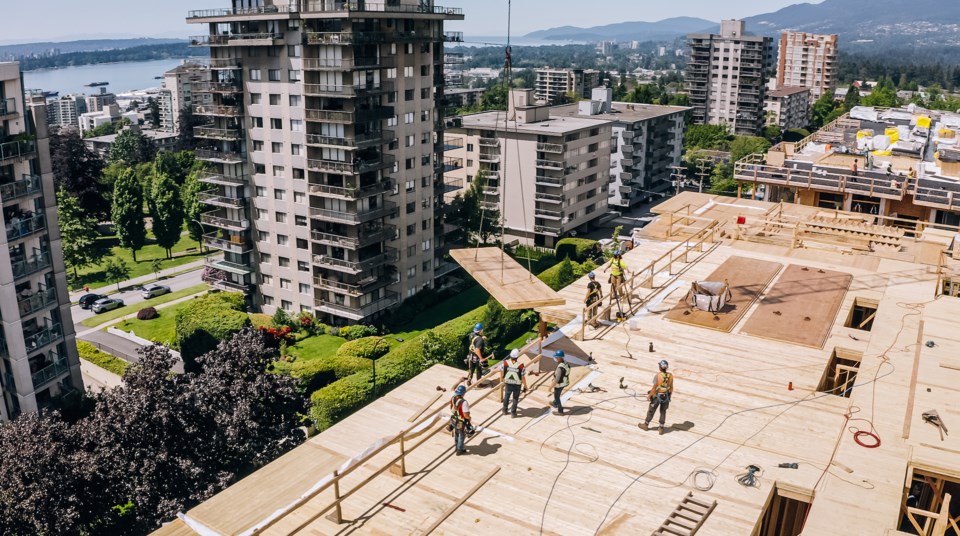Construction cost increases have become so dramatic in Metro Vancouver that they’ve outstripped land prices as the single biggest unknown in proformas for developers.
That’s the message Greg Zayadi, president of the Rennie Group, delivered to a breakfast meeting of the Independent Contractors and Businesses Association this week.
“When developers are working on proformas today, the biggest impact on the end number to the consumer is the construction pricing,” Zayadi told Western Investor following the breakfast. “The land you purchase, the cost to hold, the soft costs – all of these things are much less significant than managing the construction costs.”
Time was that land prices and construction costs were both in the $250 to $300 a square foot range. Today, construction costs are often closer to $500 a square foot.
“We’ve seen a 30 per cent increase over the past 14 to 16 months, and in the last four months we’ve estimated that it’s 5 per cent to 7 per cent a month,” Beau Jarvis, president of Wesgroup Properties said. “It’s making it extremely challenging to understand the dynamics of a viable construction project. It’s so difficult to understand what’s going on.”
Wesgroup is planning a project in East Vancouver that started out at $430 a square foot in hard costs, but when the project went to tender it came in at $525 a square foot.
“In order to make that project viable we had to raise the revenue assumptions in the project,” Jarvis said. “We haven’t launched that project yet, so we don’t know if those new revenue assumptions are even viable in the marketplace. And so that’s a project that could be paused.”
Zayadi isn’t aware of any projects that have been shelved to date by construction cost increases. But he notes the situation is hitting woodframe construction particularly hard, impacting affordability for first-time buyers.
“This is townhomes, this is six-storey woodframe, this is in-fill. This is not investor-type product,” he said. “When all of a sudden every woodframe project from Pemberton to Abbotsford is needing $750 to $800 a square foot, that is really putting pressure on that first-time homebuyer.”
Altus Group estimates that multifamily construction costs in Vancouver increased 5 to 7 per cent last year, and senior director Dave Schoonjans expects a similar increase this year.
“It doesn’t sound bad, but you’ve got developments that only have a 10 percent margin,” he said. “Say you’ve got permitting issues or some other delay, and in 12 months your profit is gone.”
But he says the situation in Vancouver is less dire than elsewhere in the country. Toronto, Montreal and to some extent Ottawa are under greater pressure because the markets there were going full-tilt when the pandemic hit. The labour constraints and supply chain disruptions made a bad situation worse, and the surge in presales over the past year has compounded the woes.
“The Vancouver market slowed down just in time for a lot of these cost increases and disruptions,” he said. “It’s not to say things are great in Vancouver and Alberta, but they’re the least bad.”
But the pressure isn’t about to let up.
Taxes and fees aren’t about to drop, and municipal approval processes have yet to catch up with demand. Census data indicate that per-capita housing in Metro Vancouver was unchanged in 2021 versus 2016, meaning the housing shortage continues.
“The most recent census is a clear indication that we have yet to make progress in meeting the housing needs of Canadians,” Scotiabank stated regarding the data.
Meanwhile, government-funded projects continue to tap into a tight labour pool, increasing cost pressures and eroding the premium that makes developers want to take risks in the market.
“There’s just not enough trades in the trade pool, and then we have commodity prices, and all of this is culminating into one point in time that is significantly impacting our costs,” Jarvis said. “It’s getting harder to pull the trigger on some of these projects. … We are already starting to see a flight of capital to where it’s easier to work and the risk premium is there.”
Recent data on new housing starts indicates this trend. In February 2022, total Metro Vancouver housing starts had plunged 38 per cent from the same month last year, to 1,365 units. Starts of new townhouses had fallen from 275 in February 2021 to just 173 in February 2022.



